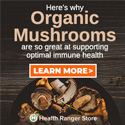
Eight reasons why depression is so common today
Friday, December 06, 2013 by: Mike Bundrant
Tags: depression, heavy metal poisoning, brain function
- Newly released JFK files reveal Pentagon's role in creating Lyme disease and covid in the same lab
- Trump nominates VACCINE ZEALOT Susan Monarez to lead the CDC, sidelining RFK Jr.'s reform efforts
- Obama accused of laundering USAID funds to fuel global protest movements, regime change operations
- Trump's greatest betrayal so far: Accelerating Middle East wars, silencing dissent, and serving Zionist masters
- STARDUST, a secretive Israeli-US startup, plans risky solar geoengineering experiment to BLOCK OUT THE SUN
- Trump shows his true colors
- $2B Roundup verdict: A landmark blow to Bayer and a win for health freedom
- Outrageous government fraud: $312M in COVID loans went to children as young as 9 months old
- Festive flavors: The sweet history, nutritional profile and health benefits of pecan pie
- Elon Musk: Aliens could be here on Earth RIGHT NOW
- Dr. Mike Yeadon releases 15-minute testimony - WATCH - about genocidal intent of COVID “vaccines”
- HUGE: Putin claims 2020 election fraud in U.S. sparked Ukraine war, calls for peace talks with Trump
- Reclaim your health: How midlife exercise reverses years of inactivity
- “Forever chemicals” in drinking water drive alarming cancer surge, new study warns
- California's social media censorship law struck down: A victory for free speech or a threat to online safety?
- Pilots report mysterious lights 'moving at extreme speeds' across Oregon skies
- SWEET SABOTAGE: CIA's secret war on Soviet sugar revealed in JFK files
- Sugarcane extract superior to cholesterol-lowering drugs?
- Newly released JFK files reveal Pentagon's role in creating Lyme disease and covid in the same lab
- Elon Musk: Aliens could be here on Earth RIGHT NOW
- Reclaim your health: How midlife exercise reverses years of inactivity
- Trump reverses course on Gaza plan, says “nobody is expelling Palestinians”
- EPA advisor admits the agency is funneling billions to climate groups ahead of Trump’s return to White House
- Big Pharma's $8 Billion bribery scheme exposed: how doctors are pushed to prescribe junk science, not heal
- Space war brewing? Russia threatens to destroy Starlink satellites
- A lack of integrity in Academia: Harvard professor found GUILTY of fraudulent research to promote CRT theory
- Survival 101: Effective EMF blocking techniques
- Rep. Nancy Mace introduces bill to ban biological males from female facilities on federal property
- Mike Adams Sermon 66: God will DESTROY ISRAEL for its wickedness
- Pilots report mysterious lights 'moving at extreme speeds' across Oregon skies
- 5 Simple steps to boost your brainpower: How to strengthen executive function in a distracted world
- Historian warns Israel may be entering an “IRREMEDIABLE DECLINE”
- Florida takes a stand: DeSantis proposes permanent ban on mRNA vaccine mandates
- RFK Jr.'s SSRI antidepressant investigation sparks liberal meltdown, exposes Big Pharma's dangerous game
- OpenAI whistleblower who dissented against how the company trained ChatGPT found dead
- Sugarcane extract superior to cholesterol-lowering drugs?
- EPA advisor admits the agency is funneling billions to climate groups ahead of Trump’s return to White House
- The Health Ranger releases “Vaccine Zombie” song and music video, using AI-animated zombies for the music video
- California's social media censorship law struck down: A victory for free speech or a threat to online safety?
- Dr. Mike Yeadon releases 15-minute testimony - WATCH - about genocidal intent of COVID “vaccines”
- The pandemic as a tool for INDOCTRINATION: Understanding “The Indoctrinated Brain” by Dr. Michael Nehls
- Mike Adams releases country western hit single: Goin’ Back in Time is Comin’ Home
- Mike Adams releases music poetry sensation: A Child of God
- RFK Jr. clears key hurdle: Sen. Susan Collins backs controversial HHS nominee, signaling a new era for health policy
- Florida takes a stand: DeSantis proposes permanent ban on mRNA vaccine mandates
- Unpacking the Lies That We’ve Been Fed – new song and music video released by Mike Adams, the Health Ranger
- Mike Adams releases new song and music video: Nothing More Disgusting Than a Globalist
- Congratulations to the FULLY UNVACCINATED as you resisted the COVID-19 PROPAGANDA MACHINE fueled by over $100 BILLION
- “Why we influenced the 2020 elections”: Facebook files reveal the coordinated effort to bury the Hunter Biden laptop story
- Michigan sheriff announces criminal investigation into 2020 election crimes, Dominion Voting Systems
- Israeli soldiers accused of even more torture and abuse in the West Bank
- Migrants are taking advantage of recent hurricanes to scam residents and loot their homes
- House Intelligence Committee calls for the ARREST and PROSECUTION of Dr. Anthony Fauci
- Peter Rost exposes Big Pharma corruption in his book “The Whistleblower: Confessions of a Healthcare Hitman”
- Red Cross issues warning to stop blood plasma donations from vaccinated people
- Scientists confirm: GENIUS brain function can be spontaneously unleashed in humans without any apparent cause
- EPA advisor admits the agency is funneling billions to climate groups ahead of Trump’s return to White House
- HYSSOP: What research reveals about the health benefits of this ancient holy herb
- Two containers with completed ballots fall out of truck in Florida
- Fully vaccinated about to see “tsunami” of illness and death, warns virologist
- Global leaders unite to clamp down on “misinformation” with UN-backed Cascais Declaration
- BREAKING: 2025 NDAA authorizes mandatory military draft of WOMEN across America… as Pentagon pursues global NUCLEAR war with both Russia and China at the same time
- Michael Yon warns of a ZIONIST TAKEOVER in Trump’s second administration
- BOMBSHELL: DNA testing kits are a SCAM to develop ethnic-specific bioweapons
- Ozempic and Wegovy weight loss drugs are injectable LIZARD VENOM PEPTIDES that may unleash a devastating wave of organ failure… side effects align with symptoms of SNAKE BITES
- Israeli soldiers accused of even more torture and abuse in the West Bank
- These 13 countries just signed an agreement to engineer a global FAMINE by destroying food supply
- NASA admits that climate change occurs because of changes in Earth’s solar orbit, and NOT because of SUVs and fossil fuels
- RFK Jr. clears key hurdle: Sen. Susan Collins backs controversial HHS nominee, signaling a new era for health policy
- Sermon 30: How Jesus reveals Caesar’s FAKE CURRENCY and FALSE AUTHORITY
- Coriander seeds: Ancient medicine backed by modern science
- Arizona officials claim Maricopa County needs 10-13 days to tabulate results of the election
Alarmingly, depression is increasing at a rate of 20% annually.
Why has depression become such an issue? Here are eight reasons that are backed by scientific evidence.
1. Toxic food: Poisoning your brain so it cannot function properly
Processed junk food is scientifically connected to depression. A University College London team researched the relationship between depression and diet.They discovered that people who regularly eat foods such as sweetened desserts, fried food, processed meat, refined grains and high-fat dairy products are 58% more likely to be clinically depressed.
Conversely, those who eat a diet rich in whole foods - fruit, vegetables and lean protein - are 26% less likely to be depressed.
A diet high in processed food is sorely lacking in key nutrition that allows your mind and body to function. Vitamin D, omega 3 fatty acids, magnesium, trace minerals...you don't find these in a pop tart.
2. Heavy metal toxicity: The silent saboteur
Conventional medicine does not consider the risk of heavy metal exposure. The truth is, there is no safe level of heavy metal exposure. If it is in your system, it is doing damage.Heavy metals such as lead, mercury and cadmium are known to interfere with cognitive function, causing depression and other neuropsychiatric symptoms. These metals accumulate in the body over time, so it doesn't take a major exposure to do long-term damage.
This is an area that demands more research by the scientific community, although the evidence is mounting. See sources at the bottom of this article.
Search for heavy metal detox protocols if you think this applies to you. Common sources of heavy metals: mercury fillings, vaccines, lead-based paint (in homes built prior to 1978, cigarettes, contaminated fish, living near a landfill, working in a dentist's office.
3. Lack of nature: Avoiding what grounds your body
The UK based mental health charity Mind has discovered the 90% of people report significant emotional benefits from eco-therapy. Eco-therapy involves simple outdoor activities such as walking in nature and gardening.A separate report released from UK charity Ramblers and Macmillan Cancer Support found that as little as two and half hours of walking or gardening per week can save lives by lowering stress levels and keep you healthier and happier.
Another study done by the University of Colorado at Boulder suggests that camping in nature for a week resets your biological clock, brings out positive hormonal change and makes you more mentally alert.
We are disconnected from nature. Our bare skin rarely touches the earth, rarely soaks up sunshine. We live indoors attached to electronic devices and it is affecting our mind and moods.
4. Psychological attachments: Unwittingly seeking old, familiar misery again and again
Psychological attachments occur when feeling miserable is more familiar (and therefore more pleasurable) than feeling good.If you were raised in an emotionally dysfunctional family, then you were forced to internalize the negative messages you received. These were painful messages, to be sure.
As a child, what did you do with the constant onslaught of emotional pain? You did the only thing you could: you learned to tolerate it. In other words, you developed a tolerance for emotional angst, even though you hated it. This was your only choice at the time.
Now, emotional angst is the norm in your life. Your tolerance for it, coupled with a lack of familiarity for feeling wonderful, encourages you to make choices that keep in the realm of familiar misery.
In fact, because of attachments, many people simply cannot tolerate happiness. It makes them feel strange and scared.
Psychological attachments are the most overlooked mental health phenomenon of our day. Because of them, we unwittingly set ourselves up for misery, even though we are unhappy doing it! Learn about the self-sabotage that comes from these attachments by watching this free video.
5. Consumerism: Desiring stuff that makes you feel empty
Mass consumerism is a modern phenomenon created on purpose by Edward Bernays, the father of public relations. Bernays and his corporate clients had one goal in mind - to program people to desire things that they didn't need.Bernays and crew called the quest, "the creation of happiness machines." If they associated consumer goods with happiness, status, wealth and power, then people would automatically begin to seek these products like little robots.
It worked. Welcome to America.
Of course, it has made us miserable. Science has proven that consumerism - seeking happiness in stuff that cannot provide happiness, then seeking more stuff to fill the ever-widening void - leads to chronic depression.
Research conducted at Northwestern University shows that people who place a high value on wealth, status, and material goods are more depressed, anxious and less sociable than those who do not.
Materialism is not just a personal problem. It's also environmental. "We found that irrespective of personality, in situations that activate a consumer mindset, people show the same sorts of problematic patterns in well being, including negative affect and social disengagement," says Northwestern University psychologist Galen V. Bodenhausen.
6. Lack of exercise: Willingness to feel lethargic
According to the Mayo Clinic, exercise reduces and prevents anxiety and depression. Moving your body releases feel good endorphins, helps with detoxification, and increases body temperature, which has calming effects.Harvard University has done a study that reviews scientific literature back to 1981. They have concluded that regular exercise is beneficial for mild to moderate depression. It is easy to see how not exercising at all could lead you straight into its jaws.
Sadly 80% of Americans do not exercise regularly, according to the Centers for Disease Control.
7. Ignorance about feelings: Trapping negative emotions in your body
Feelings like sadness, hurt and grief are meant to be expressed. Unless you block them, they will originate in your torso, then begin to flow upward through your chest, throat, face and out of your mouth and eyes. The natural flow of emotions cleanses the feelings from your body and allows you to recover.If for some reason you were taught that this natural process was bad, then you learned to block the emotional energy by tightening your stomach, chest, throat, shoulders and face. This effectively prevents the feelings from surfacing.
In other words, clenching and tightening traps the emotions in your body.
As more painful experiences occur, the damming of emotions continues. This requires and tremendous amount of energy. It creates chronic muscle tension. It's exhausting.
Of course, you end up feeling trapped, hopeless, isolated, and ungrounded.
8. It's a diagnosis: Promoting depression
Companies who sell drugs for depression are motivated. They want people to recognize symptoms of depression. They give it a name and package a remedy, then sell that remedy.Labeling depression is a two-edged sword. For many, it is a relief to understand this the symptoms are something common and real. Others fall prey to the diagnosis. After offering their doctor a few examples of poor mood, the doc slaps on a label and prescribes, drugs. He is surely overlooking other options!
As more and more people are diagnosed, more and more people can fit their experiences into the depression box. Promoting the diagnosis may account for the rise in awareness of depression.
Knowing what you can do to feel better, but not doing it
The real crux of the matter with depression may be how clingy it can be. Many depressed folks can make a list of things they know they can do to feel a little better, yet they don't do those things.This speaks to psychological attachments, the reasons why we cling to pain as if it were our friend. We've learned to be comfortable inside depression as if it were an old, familiar shoe. So, we avoid doing what it takes to recover.
Severe cases of depression are dangerous, even life threatening. It's not something that is necessarily easy to overcome, yet the causes seem clear. And there is much you can do to feel better.
If you like this article, then like my Facebook Page to keep up with all my writing.
Sources:
http://news.bbc.co.uk/2/hi/8334353.stm
http://www.ncbi.nlm.nih.gov/pubmed/9849536
http://research.mssm.edu/xrf/xrfpdf/ref628.pdf
http://www.nydailynews.com
http://www.psychologicalscience.org
http://www.mayoclinic.com/health/depression-and-exercise/MH00043
http://www.health.harvard.edu
http://www.cbsnews.com
About the author:
Watch the free video The AHA! Process: An End to Self-Sabotage and discover the lost keys to personal transformation and emotional well-being that have been suppressed by mainstream mental health for decades.
The information in this video has been called the missing link in mental health and personal development. In a world full of shallow, quick-fix techniques, second rate psychology and pharmaceutical takeovers, real solutions have become nearly impossible to find. Click here to watch the presentation that will turn your world upside down.
Mike Bundrant is co-founder of the iNLP Center and host of Mental Health Exposed, a Natural News Radio program.
Follow Mike on Facebook for daily personal development tips.
Depression at FETCH.news
Get independent news alerts on natural cures, food lab tests, cannabis medicine, science, robotics, drones, privacy and more.
Take Action: Support Natural News by linking to this article from your website
Permalink to this article:
Embed article link: (copy HTML code below):
Reprinting this article:
Non-commercial use OK, cite NaturalNews.com with clickable link.
Follow Natural News on Facebook, Twitter, Google Plus, and Pinterest
Science News & Studies
Medicine News and Information
Food News & Studies
Health News & Studies
Herbs News & Information
Pollution News & Studies
Cancer News & Studies
Climate News & Studies
Survival News & Information
Gear News & Information
News covering technology, stocks, hackers, and more



"Big Tech and mainstream media are constantly trying to silence the independent voices that dare to bring you the truth about toxic food ingredients, dangerous medications and the failed, fraudulent science of the profit-driven medical establishment.
Email is one of the best ways to make sure you stay informed, without the censorship of the tech giants (Google, Apple, Facebook, Twitter, YouTube, etc.). Stay informed and you'll even likely learn information that may help save your own life."
–The Health Ranger, Mike Adams













































